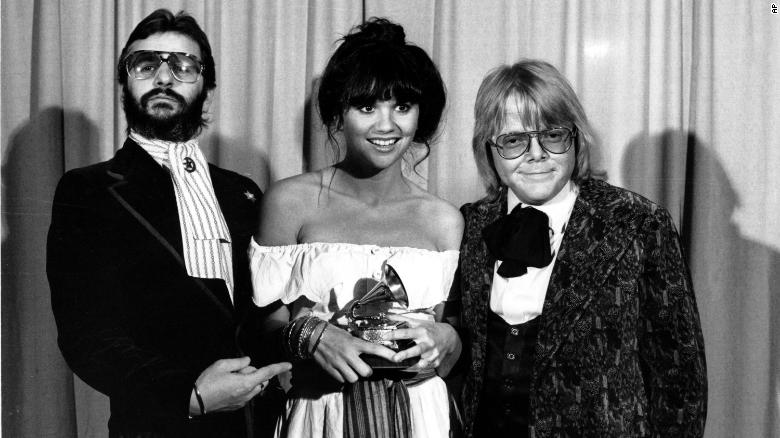Linda Ronstadt, the sound of my voice 1:24
(CNN) –-
In the late 1970s, Linda Ronstadt was the biggest female rock star in the US She won several platinum records consecutively, filled auditoriums, and her beauty graced the covers of magazines across the country.
"Linda was the queen," says Bonnie Raitt in CNN's latest film, "Linda Ronstadt, the sound of my voice."
And he adds ... "She was what Beyoncé is today."
But by the early 1980s, Linda Ronstadt had grown tired of playing big arenas and wanted to try something new.
So, after several years of recording pop with the leader of the band, Nelson Riddle, he released an album of popular Mexican songs entirely in Spanish.
Today it is difficult to understand how audacious that decision was.
The Ronstadt record company - as he recounts in "Simple Dreams", his memoirs - thought he had lost his mind.
"Recording old songs from Mexican rancherías? And all in Spanish? Impossible!"
Remember what they told you.
To put the comparison to Beyoncé into context, it would be as if at the peak of her fame she was releasing an album of songs by Icelandic sailors.
"The act of taking the risk and doing it, and the way he did it, was very brave," says the acclaimed singer, songwriter and producer, Ry Cooder, in the CNN film.
And he adds "many people would have been terrified, as if saying 'I will ruin my career'".
advertising
"Songs of my father" came out in 1987 and spent 35 weeks on the Billboard chart.
The album "Songs of My Father" won a Grammy and sold more than 2.5 million records.
And 32 years later it remains the best-selling album in the history of recorded music in the foreign language category.
The success of this album is not just a reflection of Linda Ronstadt's generous gifts.
It is also a testament to her determination to diversify as an artist while honoring her roots.
Linda Ronstadt wanted to honor her ancestry
Millions of listeners in the 70s and 80s sang Linda Ronstadt's hits on the radio in unison like "You're No Good," "It's So Easy" and "Blue Bayou."
Few realized, however, that the singer's heritage reaches Mexico.
His father, Gilber Ronstadt, was a prominent businessman of German, Mexican and English descent.
Linda grew up in Tucson, about 60 miles from the Mexican border, singing mariachi songs with him after family dinners.
"As a family we always sing in Spanish," he says in the documentary.
And although I did not understand much what he sang, it is something I learned to do.
Kind of like lip reading, you know?
I used to camouflage myself in harmony with my father ”.
Ronstadt, surrounded by Ringo Star (left) and Paul Williams, after being named best pop singer at the 1977 Grammys for her album "Hasten Down the Wind."
Making a mariachi music album was something Ronstadt wanted to do for a long time.
In the mid-1980s, he had the strength to make it happen.
"I went to the president of the record company, a man who genuinely liked music, and I said 'look, I've made all these records for you, I'll make this one just for me," he says in the documentary.
Maybe this is selfish, if it sells two copies I don't care, but if I can't record this music, I'll die. '
"There's the full story of Linda Ronstadt, right there in a nutshell," says producer John Boylan.
Linda deciding she wants to do something, the company telling her she can't;
she goes on and still does ... and they join in when things start to take off. "
She inspired a generation of Mexican Americans
Ronstadt promoted the album everywhere from “Saturday Night Live” to “Sesame Street,” where he sang “La Charreada” alongside a marionette mariachi band.
(Coincidentally, both Ronstadt and Sesame Street were recognized that year by the Kennedy Center Honors for their cultural contribution ”).
"Songs of my father" was not an immediate success, reaching number 42 on the Billboard chart.
But the album was sold and sold.
Perhaps most importantly, it became a benchmark for the Mexican-American generation, which was not used to seeing their culture embraced by the mainstream media.
President Barack Obama presents him with the National Medal of Arts, at the White House, on July 28, 2014.
"Seeing Ronstadt sing in Spanish nationally on television, the cover of his album published in the newspapers taught us that it was okay to be Mexican and not have to apologize, no matter how used we might be," wrote Gustavo Arellano in her column for the Los Angeles Times in 2017.
“With 'Songs' she did something revolutionary.
Earlier generations of huge American artists neglected their ethnicity in order to attract as many audiences as possible, ”Arellano added.
Now Ronstadt came along, deeply into her career, with a bold announcement: 'I'm Mexican, and what about that?'
Her triumph helped pave the way for younger generations of Mexican-American pop singers like Selena Gomez and Demi Lovato.
And for 3 decades, with "Songs", Latin influences have become something much less exotic within American culture.
But in 1987, Linda Ronstadt was a unique talent and an unrivaled pioneer.
CNN presents this Friday, January 1, "Linda Ronstadt, the sound of my voice."

